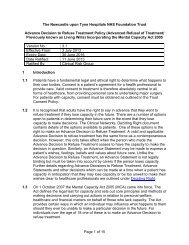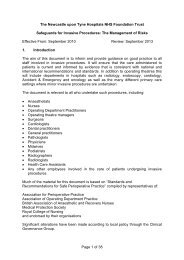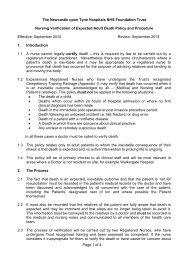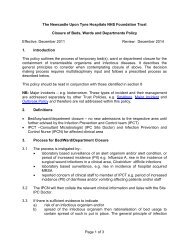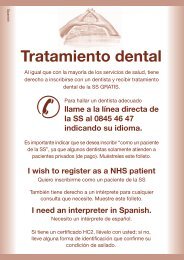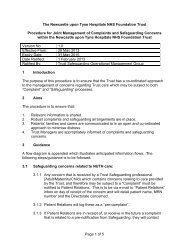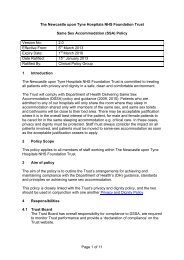Organ and Tissue Donation (63KB pdf) - Newcastle Hospitals
Organ and Tissue Donation (63KB pdf) - Newcastle Hospitals
Organ and Tissue Donation (63KB pdf) - Newcastle Hospitals
Create successful ePaper yourself
Turn your PDF publications into a flip-book with our unique Google optimized e-Paper software.
<strong>Newcastle</strong> upon Tyne <strong>Hospitals</strong> NHS Foundation Trust<br />
<strong>Organ</strong>, Corneal <strong>and</strong> <strong>Tissue</strong> <strong>Donation</strong> for Transplantation Policy<br />
Effective: January 2011 Review: January 2014<br />
1. Introduction<br />
The aim of this policy is to ensure that every patient who dies in the care of NUTH NHS<br />
trust is considered for solid organ, corneal <strong>and</strong> tissue donation.<br />
Considering solid organ, corneal <strong>and</strong> tissue donation at the end of life both in critical care<br />
areas <strong>and</strong> the wards should become a usual <strong>and</strong> unremarkable part of end of life care <strong>and</strong><br />
the bereavement process. This policy should be embedded into other trust documents<br />
dealing with end of life.<br />
Major aims are<br />
1.1 To acknowledge that the best interests of a dying patient may well involve actions<br />
designed to facilitate donation<br />
1.2 To ensure the policy complies with the Law, most notably the Human <strong>Tissue</strong> Act<br />
2004 <strong>and</strong> the Mental Capacity Act 2006<br />
1.3 To identify all potential donors at the appropriate stage<br />
• <strong>Donation</strong> after Cardiac Death (DCD) – consider at time of planning withdrawal/<br />
withholding of life sustaining treatments in a critical care area/ ED<br />
• <strong>Donation</strong> after Brain Death (DBD) – consider at time of decision to perform brain<br />
stem death tests in a critical care area<br />
• Corneal <strong>and</strong> <strong>Tissue</strong> donation – consider post mortem as part of usual<br />
communication with bereaved relatives on all hospital wards.<br />
1.4 To check if a potential donor is registered on the national organ donor register (ODR)<br />
<strong>and</strong> to ensure that if possible their valid pre-mortem wishes with respect to donation<br />
are fulfilled<br />
1.5 To ensure that all families of potential donors are approached <strong>and</strong> given a chance to<br />
consider the option of organ, corneal or tissue donation as appropriate. For those<br />
patients not on the ODR, families should be asked about any views the patient may<br />
have expressed regarding donation.<br />
1.6 To act sensitively at all times when dealing with families of potential donors <strong>and</strong> to<br />
emphasise the benefits of donation. There should however, never be pressure on a<br />
family to donate or coercive practices used.<br />
2. Rationale<br />
The latest NHSBT survey shows that over 90% of the population are in favour of organ<br />
donation <strong>and</strong> that 27% of adults are now on the ODR. 59% of all UK deaths now occur in<br />
hospital. Hospital staff therefore have a duty of care to ensure that wishes expressed in life<br />
pertaining to donation are fulfilled if possible. Failure to consider <strong>and</strong> ask about donation at<br />
the end of life is to deny patients <strong>and</strong> their families their right to donate <strong>and</strong> help others<br />
after their deaths. Such a failure denies families the benefits that can arise from the<br />
positive act of donation.<br />
Page 1 of 6
<strong>Newcastle</strong> <strong>Hospitals</strong> is a strong advocate of donation<br />
• As a nationally <strong>and</strong> internationally recognised centre for transplantation, staff in<br />
this organisation are well aware of the benefits organ donation can bring<br />
• This will be consolidated by the building of the Institute of Transplantation<br />
• <strong>Newcastle</strong> <strong>Hospitals</strong> have a very well established solid organ donation<br />
programme in critical care, <strong>and</strong> has consistently had the highest numbers of<br />
DBD donors in the UK over the last 5 years<br />
• <strong>Newcastle</strong> <strong>Hospitals</strong> is a UK corneal donor <strong>and</strong> transplantation centre <strong>and</strong> is<br />
committed to achieving a high corneal donation rate to continue this service<br />
• The patient is at the heart of everything NUTH does. Ensuring a patient’s right to<br />
donate is explored in each <strong>and</strong> every case should be considered part of this<br />
philosophy.<br />
3. Solid <strong>Organ</strong> <strong>Donation</strong><br />
Solid organ donation may be possible following death on adult or paediatric critical care<br />
<strong>and</strong> occasionally following death in the emergency department. There are two groups of<br />
potential solid organ donors.<br />
3.1 <strong>Donation</strong> following Brain Death (DBD).<br />
This is more correctly described as donation following the confirmation of death by<br />
neurological criteria. Following catastrophic brain injury, suspected brain death will<br />
be confirmed according to the Academy of Royal Colleges Code of Practice for the<br />
Diagnosis <strong>and</strong> Confirmation of Death (2008). Such a patient has the highest solid<br />
organ donor potential <strong>and</strong> may go onto donate heart, lungs, liver, pancreas,<br />
pancreatic islets, kidneys <strong>and</strong> small bowel.<br />
3.1.2 The on call Specialist Nurse for <strong>Organ</strong> <strong>Donation</strong> (SN-OD) or in house<br />
coordinator should be contacted in all cases when it is agreed brain death<br />
tests are to take place. They should establish if there are contra-indications<br />
to donation <strong>and</strong> check the ODR.<br />
3.1.3 On confirming brain death, a planned approach to family requesting should<br />
be undertaken. Strong consideration should be given to ‘collaborative’<br />
requesting by both medical <strong>and</strong> nursing staff <strong>and</strong> SN-OD.<br />
3.1.4 If the patient is on the ODR or other suitable consent has been obtained from<br />
the family, the donor should be managed according to local <strong>and</strong> national<br />
protocols to optimise the function of subsequently transplanted organs.<br />
3.2 <strong>Donation</strong> following Cardiac Death (DCD)<br />
Following death confirmed by determining cessation of breathing <strong>and</strong> heart beat<br />
(cardio-respiratory criteria) solid organ donation may sometimes be possible. There<br />
are two situations where this is so.<br />
3.2.1 Category III DCD.<br />
The majority of deaths in an intensive care setting occur after realisation <strong>and</strong><br />
agreement that continuing aggressive organ support is no longer in a<br />
Page 2 of 6
patient’s best interest. A decision is made to withdraw or withhold organ<br />
support treatments for example ventilatory or circulatory support. In many<br />
cases there is control over the timing of this event.<br />
If death occurs within a pre-defined time period following withdrawal of organ<br />
support (usually 4 hours) donation of kidneys, liver <strong>and</strong> lungs may be<br />
possible.<br />
3.2.2 All patients on critical care in whom a treatment limiting decision is being<br />
made should be referred to the SN-OD if:<br />
• the patient is considered stable enough for the process of organising<br />
DCD to be achieved (4 -6 hours)<br />
• the death will realistically occur in a 4 hour time period from<br />
withdrawal<br />
3.2.3 The process of DCD including timing <strong>and</strong> manner of requesting <strong>and</strong><br />
subsequent management should be in accordance with local <strong>and</strong> national<br />
flowcharts <strong>and</strong> protocols.<br />
3.2.4 The conduct of DCD in NUTH NHS trust shall be in compliance with<br />
Department of Health Legal Guidance on <strong>Donation</strong> after Cardiac Death<br />
(2009)<br />
3.2.5 Category II DCD<br />
NUTH is one of only two UK centres where donation is considered <strong>and</strong><br />
facilitated in patients who die in the emergency department following<br />
unsuccessful resuscitation following cardiac arrest. This so called<br />
uncontrolled donation is possible only with a very rapid response by the<br />
retrieval team <strong>and</strong> is therefore possible between the hours of 0900 – 1700 ,<br />
Monday to Friday. The decision to activate the retrieval team should be made<br />
by the consultant <strong>and</strong> senior nurse in the resuscitation department.<br />
3.3 Screening of Critical Care Areas for potential solid organ donors<br />
The NUTH in house SN-OD (J. Newby 21750) or in her absence or at weekends<br />
the regional on call SN-OD shall contact each critical care area on a daily basis.<br />
This is to ascertain the likelihood of brain death tests being performed or a<br />
withdrawal decision being made that day. This is to aid planning of SN-OD activities<br />
<strong>and</strong> to act as a reminder to teams to consider organ donation.<br />
4. Theatre Access<br />
A solid organ retrieval procedure should be considered a medical emergency <strong>and</strong> theatre<br />
space should be identified <strong>and</strong> prepared rapidly. This will be coordinated by the SN-OD<br />
<strong>and</strong> sister in charge of adult or paediatric (as appropriate) theatres on site.<br />
5. Corneal <strong>and</strong> <strong>Tissue</strong> <strong>Donation</strong><br />
NUTH is one of ten national eye retrieval schemes funded by DoH via NHS Blood <strong>and</strong><br />
Transplant. The aim of the scheme is to increase the rate <strong>and</strong> quality of eyes donated for<br />
transplant.<br />
Page 3 of 6
The scheme employs two full time specialist nurses (J. Potts 29288, T. Lawther 29112)<br />
who are committed to assessing potential eye donors within NUTH <strong>and</strong> offering all<br />
bereaved relatives of suitable donors the option of donation.<br />
These nurses are available to educate <strong>and</strong> support NUTH staff in order to facilitate the<br />
referral <strong>and</strong> donation process.<br />
At weekends nurse practitioners from the NHS BT National Referral Centre in Liverpool<br />
are available to assist with this service, contact 0800 4320559.<br />
A required referral form should be completed <strong>and</strong> acted upon for all deaths occurring in the<br />
trust. This document ensures contact with the eye retrieval scheme is made following all<br />
deaths. Training will be delivered regarding this process such that ward staff are able to<br />
discuss corneal <strong>and</strong> tissue donation with families as a routine part of bereavment care.<br />
6. The Coroner<br />
In all cases Critical care areas <strong>and</strong> wards must contact the coroner regarding those deaths<br />
meeting the criteria for referral as set out in the Coroners Act (1988).<br />
The <strong>Newcastle</strong> Coroner has historically been very supportive of donation across a wide<br />
range of circumstances. The coroner’s office should be involved early <strong>and</strong> ideally prior to<br />
requesting from a family to ensure a donation would be possible.<br />
In the case of DCD in a situation that the coroner would be informed post mortem, the<br />
unusual step of contacting the coroner before death must be undertaken. This should be<br />
by a consultant who knows the patient. The coroner must hear the details of the patient<br />
<strong>and</strong> will give permission or otherwise for a DCD to go ahead.<br />
The SN-OD team have established good relations with the <strong>Newcastle</strong> Coroner’s Office <strong>and</strong><br />
may usefully be involved in these discussions.<br />
7. Consent<br />
The Human <strong>Tissue</strong> Act 2004 makes it lawful to respect the wishes of an individual who has<br />
declared a wish to donate organs/ tissue after death. It makes it clear that such wishes<br />
should take precedence. It is thus lawful to take organs for transplantation where the<br />
deceased consented before death. However, it remains good <strong>and</strong> universal practice to<br />
ensure relatives are consulted <strong>and</strong> their assent gained.<br />
If an individual has not expressed a wish to donate their organs or tissues after death, the<br />
HTA 2004 requires ‘appropriate consent’ from an appropriate qualifying relative. Qualifying<br />
relatives are ranked in order for when consent is being sought.<br />
The SN-OD team members <strong>and</strong> specialist corneal donation nurses are trained to take<br />
consent for donation to NHS BT st<strong>and</strong>ards.<br />
8. Donor assurances<br />
The SNOD/ corneal donor nurse will undertake a risk assessment on all potential donors<br />
to minimise the transmission of infections <strong>and</strong> disease. In order to assess the risk of<br />
transmission of certain infections, it is important to obtain as much information as possible<br />
about the potential donors (Department of Health’s Advisory Committee on the<br />
Microbiological Safety of Blood <strong>and</strong> <strong>Tissue</strong>s for Transplantation, Guidance on the<br />
Microbiological Safety of Human <strong>Organ</strong>s, <strong>Tissue</strong>s <strong>and</strong> Cells used in Transplantation 2000).<br />
This will involve reviewing the potential donor case notes, interviewing the next of<br />
Page 4 of 6
kin/significant other, examining the potential donor <strong>and</strong> contacting the general practitioner.<br />
It is the donor transplant co-ordinator/tissue co-ordinator’s responsibility after undertaking<br />
a thorough assessment of the potential donor to discuss all relevant information with the<br />
transplant surgeons/relevant tissue banks. The decision on donor suitability is the<br />
responsibility of the transplant surgeon/relevant tissue banks. (NHSBT)<br />
9. Dealing with positive virology screening in potential donors<br />
Blood samples for virology testing (HIV, Hepatities B,C,D) <strong>and</strong> tissue typing are taken from<br />
the potential donor in order to ascertain suitability as outlined above. These samples are<br />
tested on behalf of the transplant teams in laboratories outside the trust. The results are<br />
made available to the transplant teams. If the results of any samples tested negate<br />
donation for reasons that could potentially impact on the health <strong>and</strong> well being of the next<br />
of kin / significant others the senior clinician has a duty of care to ensure they are made<br />
aware of this possibility. Permission should be sought to contact their GP. Prior to giving<br />
assent to the donation process, families <strong>and</strong> other involved parties should be made aware<br />
of the consequences of a positive result.<br />
10. Education<br />
The trust, through the Specialist Nurses for <strong>Organ</strong> <strong>Donation</strong>, Clinical Leads <strong>and</strong> the staff of<br />
the Eye Retrieval Scheme are responsible for ensuring <strong>and</strong> maintaining education of all<br />
grades <strong>and</strong> disciplines of staff. Each critical care area shall have a link nurse for organ<br />
donation.<br />
The trust recognises that much educational work is required on non critical care wards<br />
where tissue <strong>and</strong> corneal donation requesting is less frequent. Education efforts should<br />
concentrate on wards of likely high tissue donation potential.<br />
11. Structure of Administration of <strong>Donation</strong> Activity in NUTH<br />
The Trustwide <strong>Donation</strong> Committee shall be answerable to the Board regarding all<br />
donation activity in NUTH. It shall determine policy <strong>and</strong> areas of prioritisation <strong>and</strong> be<br />
responsible for all areas of donation activity. It has established terms <strong>and</strong> conditions <strong>and</strong><br />
membership.<br />
12. Monitoring<br />
The Trust is committed to full participation in the National Potential Donor Audit. Collated<br />
results will be presented to the Trust Board on an annual basis as part of the annual report<br />
into donation activity.<br />
Author: Chair <strong>Donation</strong> Committee<br />
Page 5 of 6
THE NEWCASTLE UPON TYNE HOSPITALS NHS FOUNDATION TRUST<br />
IMPACT ASSESSMENT – SCREENING FORM A<br />
This form must be completed <strong>and</strong> attached to any procedural document when submitted to the appropriate committee for consideration <strong>and</strong> approval.<br />
Policy Title: <strong>Organ</strong>, Corneal <strong>and</strong> <strong>Tissue</strong> <strong>Donation</strong> for Transplantation Policy Policy Author: Lynn Robson – Senior Transplant Coordinator<br />
Yes/No? You must provide evidence to support your response:<br />
1. Does the policy/guidance affect one group less or more favourably than another on<br />
the basis of the following: (* denotes protected characteristics under the Equality<br />
Act 2010)<br />
• Race * No<br />
• Ethnic origins (including gypsies <strong>and</strong> travellers) No<br />
• Nationality No<br />
• Gender * No<br />
• Culture No<br />
• Religion or belief * No<br />
• Sexual orientation including lesbian, gay <strong>and</strong> bisexual people * No<br />
• Age * No<br />
• Disability – learning difficulties, physical disability, sensory impairment <strong>and</strong><br />
mental health problems *<br />
No<br />
• Gender reassignment * No<br />
• Marriage <strong>and</strong> civil partnership * No<br />
2. Is there any evidence that some groups are affected differently? No<br />
3. If you have identified potential discrimination which can include associative<br />
discrimination i.e. direct discrimination against someone because they associate<br />
with another person who possesses a protected characteristic, are any exceptions<br />
N/A<br />
valid, legal <strong>and</strong>/or justifiable?<br />
4(a).<br />
Is the impact of the policy/guidance likely to be negative?<br />
(If “yes”, please answer sections 4(b) to 4(d)).<br />
N/A<br />
4(b). If so can the impact be avoided?<br />
4(c). What alternatives are there to achieving the policy/guidance without the impact?<br />
4(d) Can we reduce the impact by taking different action?<br />
Comments:<br />
Action Plan due (or Not Applicable): N/A<br />
Name <strong>and</strong> Designation of Person responsible for completion of this form: Dr Angus Vincent, Consultant in Intensive Care Date: 2/11/11<br />
Names & Designations of those involved in the impact assessment screening process: Dr Angus Vincent, Consultant in Intensive Care<br />
(If any reader of this procedural document identifies a potential discriminatory impact that has not been identified on this form, please refer to the Policy Author identified above, together<br />
with any suggestions for the actions required to avoid/reduce this impact.)<br />
For advice on answering the above questions please contact Frances Blackburn, Head of Nursing, Freeman/Walkergate, or, Christine Holl<strong>and</strong>, Senior HR Manager. On completion this form must be forwarded<br />
electronically to Steven Stoker, Clinical Effectiveness Manager, (Ext. 24963) steven.stoker@nuth.nhs.uk together with the procedural document. If you have identified a potential discriminatory impact of this<br />
procedural document, please ensure that you arrange for a full consultation, with relevant stakeholders, to complete a Full Impact Assessment (Form B) <strong>and</strong> to develop an Action Plan to avoid/reduce this<br />
impact; both Form B <strong>and</strong> the Action Plan should also be sent electronically to Steven Stoker within six weeks of the completion of this form.<br />
IMPACT ASSESSMENT FORM A October 2010


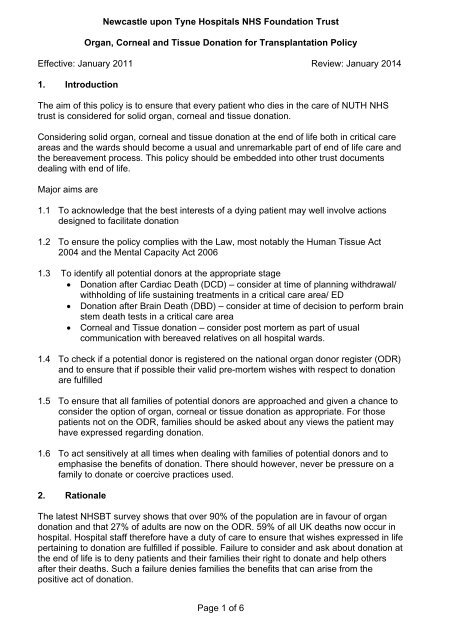
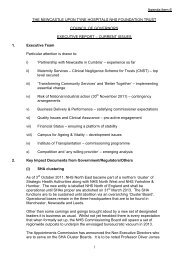
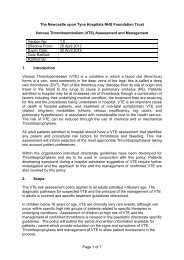
![Standard Precautions Policy - 112KB [PDF] - Newcastle Hospitals](https://img.yumpu.com/51150129/1/184x260/standard-precautions-policy-112kb-pdf-newcastle-hospitals.jpg?quality=85)
![Oxygen Management Policy - 38KB [PDF] - Newcastle Hospitals](https://img.yumpu.com/50798872/1/184x260/oxygen-management-policy-38kb-pdf-newcastle-hospitals.jpg?quality=85)
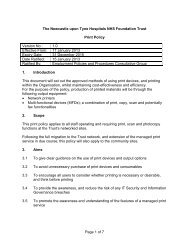
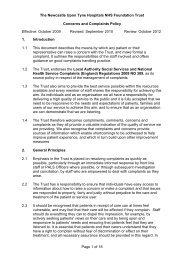
![Patient Identification Policy - 130KB [PDF] - Newcastle Hospitals](https://img.yumpu.com/49156101/1/190x245/patient-identification-policy-130kb-pdf-newcastle-hospitals.jpg?quality=85)
